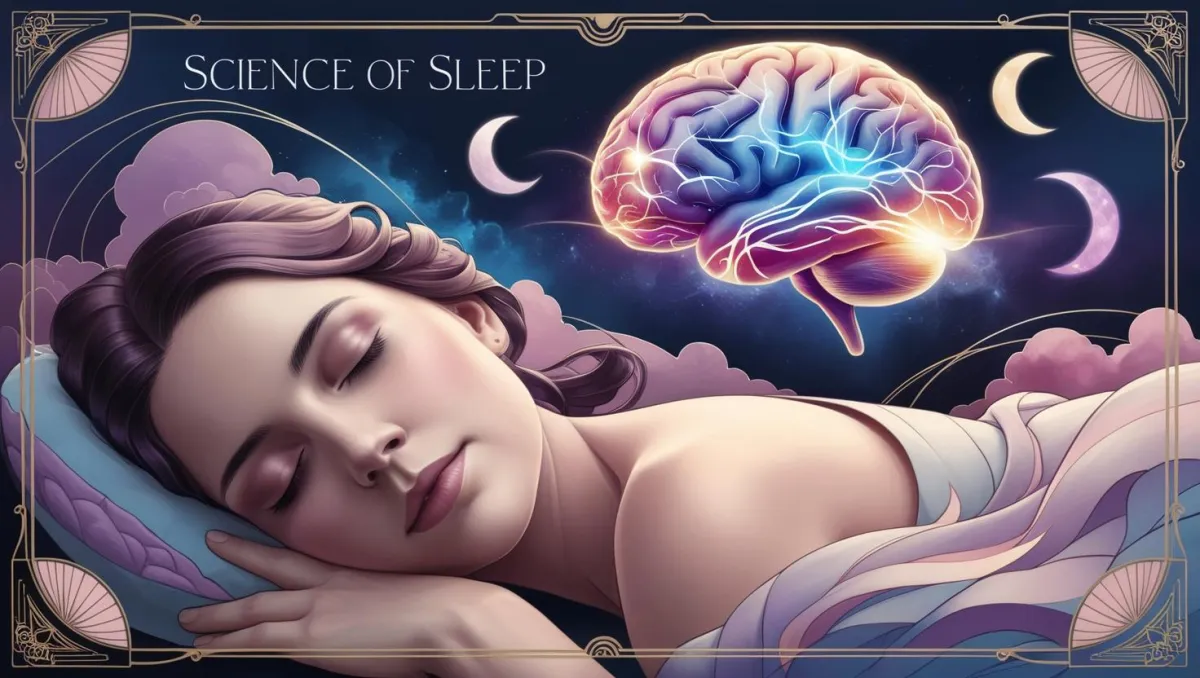Blog

The Science of Sleep — Why It’s the Most Important Thing You’re Ignoring
“What if I told you that just one night of poor sleep can make you as impaired as being legally drunk? Or that sleep deprivation costs the U.S. economy over $400 billion annually?
Sleep isn’t just a luxury — it’s a biological necessity. Yet, in our fast-paced world, it’s often the first thing we sacrifice. We spend one-third of our lives sleeping, but most of us don’t truly understand its power.
Today, we’ll uncover the science of sleep, the shocking consequences of sleep deprivation, and the best science-backed strategies to sleep better — without relying on medication. By the end of this video, you’ll see sleep not as a waste of time, but as your ultimate superpower.”
What Happens When You Sleep?
Sleep isn’t just a passive state — it’s an active, complex process that your brain and body need to function. Every night, you cycle through four stages of sleep, each with its own purpose.
Stage 1 & 2: Light Sleep
This is your body’s way of winding down. Your heart rate slows, and your brain produces theta waves, preparing you for deeper sleep.
Stage 3: Deep Sleep
This is where the magic happens. Your body repairs muscles, strengthens your immune system, and releases growth hormones. Deep sleep is essential for physical recovery and energy restoration.
Stage 4: REM Sleep
During REM (rapid eye movement) sleep, your brain is as active as when you’re awake. This is when dreaming occurs, and your brain consolidates memories, boosts creativity, and processes emotions.
Fascinating Fact: During REM sleep, your body is temporarily paralyzed to prevent you from acting out your dreams!
Disrupting these cycles — whether through poor sleep habits or insomnia — can lead to fatigue, memory issues, and even long-term brain damage. That’s why understanding sleep cycles is the first step to unlocking better sleep.
The Shocking Effects of Sleep Deprivation
Sleep deprivation isn’t just about feeling tired — it’s a serious health risk. Let’s break it down:
Lack of sleep impairs decision-making, memory, and focus. Studies show that after just 24 hours without sleep, your cognitive performance is as bad as someone with a blood alcohol level of 0.10% — legally drunk in most countries.
Sleep deprivation is also closely linked to depression and anxiety. When you don’t sleep, your brain struggles to regulate emotions, making you more irritable and prone to mood swings.
Chronic sleep deprivation weakens your immune system, increases your risk of heart disease, and can even lead to diabetes. It also disrupts hormones that control hunger, making you more likely to overeat and gain weight.
Research shows that people who consistently sleep less than six hours a night have a higher risk of early death.
A real-life example is the Chernobyl nuclear disaster and the Challenger space shuttle explosion were both linked to human errors caused by sleep deprivation.
Here’s a fascinating Fact: Sleep-deprived drivers are responsible for over 6,000 fatal car crashes annually in the U.S. alone.
Why Sleeping Pills Aren’t Always the Answer
“Insomnia affects millions of people worldwide, but reaching for sleeping pills isn’t always the best solution. Here’s why:
They Don’t Improve Sleep Quality:
Sleeping pills may help you fall asleep faster, but they don’t promote natural sleep cycles. You might wake up feeling groggy and unrested.
They Cause Dependence:
Over time, your body builds a tolerance to sleeping pills, meaning you’ll need higher doses to achieve the same effect. This can lead to addiction.
Long-Term Risks
Prolonged use of sleeping pills has been linked to memory loss, brain fog, and even an increased risk of dementia.
Scientific Fact: Cognitive Behavioral Therapy for Insomnia (CBT-I) is proven to be more effective than sleeping pills in the long term. It addresses the root causes of insomnia, like stress and poor sleep habits, without the risks of medication.”
The Hidden Causes of Poor Sleep
Poor sleep isn’t just about stress or a busy schedule. Here are some hidden culprits:
The blue light emitted by phones, tablets, and computers suppresses melatonin, the hormone that signals your brain it’s time to sleep.
Caffeine & Alcohol
Caffeine can stay in your system for up to six hours, disrupting deep sleep. Alcohol, while it may make you drowsy, fragments your sleep and reduces REM sleep.
A racing mind keeps your brain too alert to relax. Worrying about work, relationships, or life in general can make it nearly impossible to fall asleep.
Poor Sleep Environment
A room that’s too hot, too bright, or too noisy can sabotage your sleep.
Interesting Fact: Just one cup of coffee can affect your sleep for up to six hours!
How to Improve Sleep Naturally — Science-Backed Solutions
Ready to transform your sleep? Here are six science-backed strategies:
Follow a Consistent Sleep Schedule:
Go to bed and wake up at the same time every day — even on weekends. This strengthens your circadian rhythm, improving sleep quality.
Get sunlight in the morning to boost melatonin production at night. Avoid screens an hour before bed, and use red-toned lights in the evening.
Create a Sleep-Inducing Environment
Keep your room cool (60–67°F or 16–19°C), use blackout curtains, and reduce noise with white noise machines or earplugs.
Relax Before Bed
Try meditation, deep breathing on Luvo, or reading a book to calm your mind. Journaling can also help clear your thoughts.
Eat Sleep-Friendly Foods
Magnesium-rich foods (like nuts and leafy greens) and tryptophan-rich foods (like turkey and bananas) can promote better sleep. Avoid heavy meals before bed.
Exercise at the Right Time
Morning or afternoon exercise improves sleep, but avoid intense workouts late at night — they can raise your body temperature and stress hormones.
The Unbelievable Benefits of Sleeping Well
Prioritizing sleep isn’t just about avoiding fatigue — it’s about unlocking your full potential. Here’s what good sleep can do for you:
Boosts Memory & Learning:
Students who sleep well perform better academically.
Improves Creativity:
Many great ideas, like the periodic table and the melody for ‘Yesterday,’ came from dreams.
Good sleep is also linked to a longer, healthier life.
Enhances Athletic Performance:
Top athletes like LeBron James prioritize sleep to stay at their peak.
Strengthens Your Immune System:
Poor sleep makes you more susceptible to colds and infections.
Good sleep also improves mental health by reducing anxiety, depression, and mood swings.
Final Thoughts & Conclusion
Sleep isn’t a luxury — it’s a necessity. It’s your body’s way of repairing, restoring, and preparing you for the challenges ahead. By understanding the science of sleep and making small changes to your habits, you can transform your health, productivity, and mental well-being. Download our free app Luvo for sleep analysis.
Remember: ‘The best bridge between despair and hope is a good night’s sleep.’ So tonight, give yourself the gift of rest. Your future self will thank you.”
Scientific Sources for Credibility
1. National Sleep Foundation — Sleep cycles and their importance.
2. Harvard Medical School — Effects of sleep deprivation on health.
3. American Psychological Association (APA) — Cognitive Behavioral Therapy for Insomnia (CBT-I).
4. Mayo Clinic — Risks of sleeping pills and natural sleep solutions.
5. Matthew Walker, PhD — Author of Why We Sleep and sleep researcher.
Categories

© Copyright Luvo 2022
